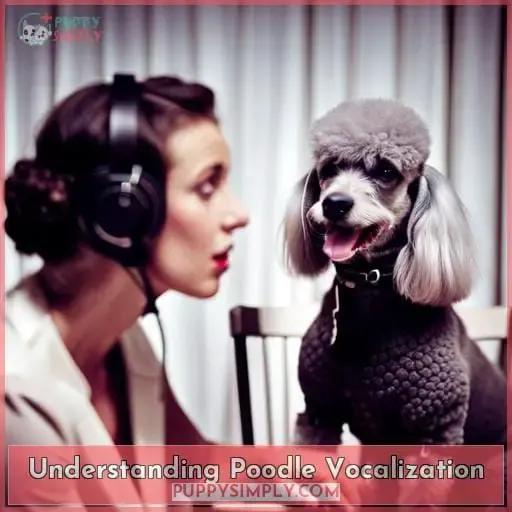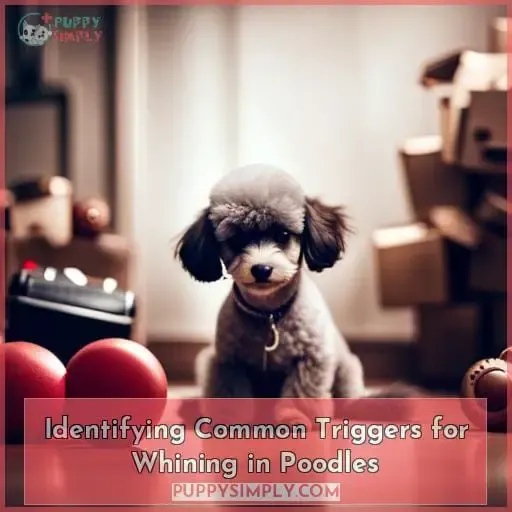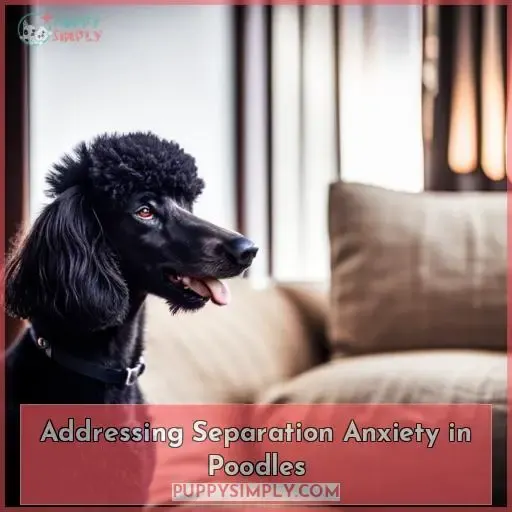This site is supported by our readers. We may earn a commission, at no cost to you, if you purchase through links.
 Imagine this: you’re sitting on the couch, enjoying a quiet evening when suddenly your poodle starts whining and crying for seemingly no reason. It can be frustrating and confusing to understand why they do this. But fear not! In this article, we will explore the reasons behind why poodles cry and provide effective ways to address their whining behavior.
Imagine this: you’re sitting on the couch, enjoying a quiet evening when suddenly your poodle starts whining and crying for seemingly no reason. It can be frustrating and confusing to understand why they do this. But fear not! In this article, we will explore the reasons behind why poodles cry and provide effective ways to address their whining behavior.
Table Of Contents
- Key Takeaways
- Understanding Poodle Vocalization
- Identifying Common Triggers for Whining in Poodles
- Addressing Separation Anxiety in Poodles
- Managing Excessive Whining in Poodles
- Strategies for Calming a Whining Poodle
- Preventing Tear Stains in Poodles
- Seeking Professional Help for Chronic Whining
- Creating a Bond With Your Whining Poodle
- Conclusion
Key Takeaways
- Poodle vocalization can indicate various needs or emotions, such as hunger, boredom, anxiety, fear, pain, or even submissive behavior.
- Separation anxiety is a common cause of whining in poodles and can be addressed through desensitization, distraction, and reinforcement of independence.
- Whining in poodles can be triggered by factors such as hunger, attention-seeking behavior, emotional distress, pain or discomfort, and submissive tendencies.
- To manage excessive whining, engage in behavioral conditioning techniques, provide adequate exercise and mental stimulation, and use distraction techniques, calming treats, and tools.
Understanding Poodle Vocalization
When it comes to understanding poodle vocalization, it’s important to recognize that whining serves as a form of communication.
Whining can indicate various needs or emotions, such as hunger, boredom, anxiety, fear, pain, or even submissive behavior.
By paying attention to the context and accompanying signs exhibited by your poodle when they cry or whine you can gain valuable insights into their well-being and address their specific needs effectively.
Communication Through Whining
You’re often communicating through whining as poodles frequently vocalize to express their needs or desires.
Whining triggers like separation anxiety or anticipation for meals reveal insights into your vocalizations.
Seeking solutions to address separation distress or utilizing calming techniques prevents escalated whining for attention.
With compassionate understanding of communication motivations and professional assistance if excessive, a stronger bond forms.
Separation Anxiety
If your poodle is prone to whining, it may be a sign of separation anxiety. This condition stems from a strong attachment and need for closeness with owners.
- Desensitize through gradual departures
- Distract with stimulating toys
- Use calming aids like Adaptil
- Reinforce independence
Stay patient, as treating separation anxiety requires consistency and time to strengthen your bond.
Identifying Common Triggers for Whining in Poodles
To effectively address your Poodle’s whining behavior, it’s important to identify the common triggers that may be causing their vocalization.
This breed tends to whine in anticipation of certain events like mealtimes, walks, playtime or your arrival home.
Their whining may also indicate boredom and inadequate mental stimulation. Poodles are very smart and need puzzle toys and training games to occupy them.
Changes to their environment like introducing new people, pets or furniture can also trigger whining.
Finally, Poodles are prone to separation anxiety so leaving them alone can prompt excessive vocalizing behavior.
Once you determine the triggers behind your Poodle’s whining, you can better manage it through behavioral conditioning techniques like positive reinforcement training and providing appropriate outlets for their energy.
Addressing Separation Anxiety in Poodles
When addressing separation anxiety in poodles, it’s important to understand the underlying causes and implement effective strategies for alleviating their distress.
Comforting routines: Establishing consistent daily routines can provide a sense of security and predictability for your poodle.
Interactive toys: Engaging your dog with interactive toys can distract them from their anxious feelings when they’re alone.
Whining triggers: Take note of what triggers your poodle’s whining, such as specific actions or events, so that you can address those specifically.
Owner presence: Gradually increasing the time spent away from your dog while still being present in the house can help them become more comfortable with being alone over time.
By incorporating these strategies into training and providing mental stimulation through comforting routines and interactive toys, you’ll be able to support your poodle in overcoming separation anxiety effectively.
Managing Excessive Whining in Poodles
You’ll need to address persistent whining through positive reinforcement training and by identifying the root causes.
Whining in poodles can be triggered by various factors, including hunger, attention-seeking behavior, emotional distress, pain or discomfort, and submissive tendencies.
To manage excessive whining in your poodle effectively, it’s essential to engage in behavioral conditioning techniques that promote desired behaviors while discouraging whining.
Providing adequate exercise essentials for physical and mental stimulation is crucial as well since boredom and lack of activity can contribute to excessive vocalization.
Additionally, maintaining good neighbor relations requires addressing any issues related to barking caused by your poodle’s constant whining.
If you’re unable to dedicate enough time due work commitments alternative options such as doggy daycare may help prevent separation anxiety which could lead loud displays of distress.
By utilizing reward-based training methods, understanding potential triggers for their crying behavior,and providing a stimulating environment,you can effectively manage excessive whining in your beloved poodle companion.
Strategies for Calming a Whining Poodle
You can try various techniques to calm your whining poodle.
Providing distraction with interactive toys when you leave the house may shift their focus away from separation anxiety.
Calming treats and tools like Thundershirts can also help relieve any stress or anxiety underlying the vocalizations.
Distraction Techniques
By diverting your poodle’s attention with interactive toys or treats when they start whining, you’re able to calm them without reinforcing the behavior.
- Engage them with distraction games using squeaky toys or balls.
- Present mental challenges like hiding treats to find.
- Initiate playtime fun through tug-of-war or chasing games.
This redirects their focus, fulfills their needs for stimulation, and prevents escalated vocalization. Balancing this approach with addressing any underlying issues causing the whining will help strengthen your bond.
Calming Treats and Tools
These calming aids can soothe your poodle’s anxiety when used judiciously.
Consult your vet before trying supplements.
Consider calming treats, sprays, music and pheromone plugins.
Monitor for improved relaxation and less vocalizing or destructive behaviors.
Adjust as needed, but seek professional help if whining persists despite your efforts.
Preventing Tear Stains in Poodles
To prevent tear stains in your Poodle, incorporate proper eye hygiene into their daily routine.
- Gently wipe your poodle’s eyes and face each day with a soft, damp cloth to remove any buildup.
- Check for signs of allergies or irritation, like excessive tearing or redness.
- Make dietary changes if needed; some ingredients may contribute to staining.
- Clean your poodle’s face daily to prevent buildup.
- Monitor their eyes for signs of allergies or irritation.
- Adjust their diet if certain ingredients seem to cause tearing.
Poodles are prone to tear stains due to their breed-specific features. By keeping their eyes and face clean and addressing any allergies, you can help minimize staining and promote their comfort.
Seeking Professional Help for Chronic Whining
If your poodle is experiencing chronic whining, it may be beneficial to seek professional help from a qualified veterinarian or animal behaviorist.
The cost of therapy depends on the types available and the availability of therapists in your area, but the benefits can be immense in addressing concerning whining behaviors.
Different therapy options include pharmaceuticals to reduce anxiety, pheromone products to induce calmness, and cognitive-based approaches to modify unwanted apology tendencies. Strategies range from conditioning and counterconditioning techniques to structured management plans.
When finding the right therapist, prioritize experience with canine PTSD, veterinary care for mental illness in dogs, and expertise designing dog apologizing prevention protocols to match your poodle’s specific needs.
Creating a Bond With Your Whining Poodle
Build a Strong Bond with Your Whining Poodle by Prioritizing Quality Time and Consistent Training.
Set aside dedicated one-on-one play and training sessions daily to reinforce positive behaviors through positive reinforcement.
Be patient in addressing attention-seeking whining and understand it arises from your poodle’s deep capacity for love.
Consistency trains good habits over time – stay calm, be loving yet firm when whining occurs.
Vocal breeds like poodles thrive on engagement – a well-bonded poodle will channel its smarts into better outlets. Investing patiently in your relationship fosters trust and curbs unhealthy attention demands.
Humor occasional vocal bids while redirecting towards approved toys and tasks befitting this lively breed.
Conclusion
As you build trust through consistency and compassion, this whining companion can transform into a gentle giant.
Like maneuvering a maze, patience and positivity steer you towards relief.
Progress emerges subtly, then a affectionate poodle remains by your side.
Stay persistent and savour the silence as you both relax into the calm.
With time, a once restless friend may now doze by your feet.














